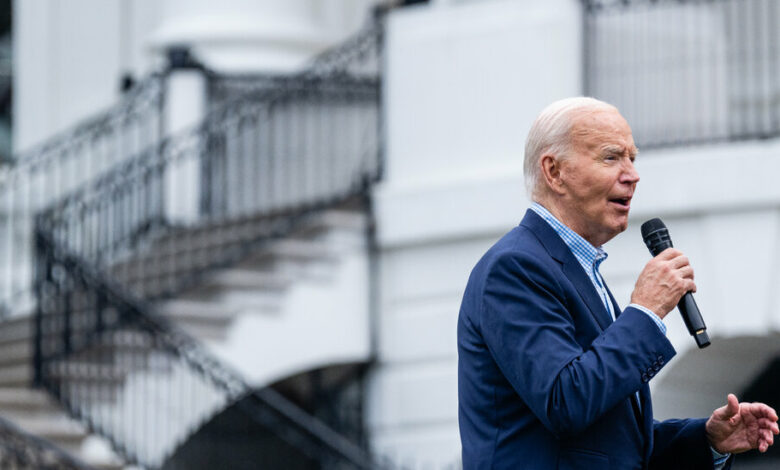Biden to campaign in Wisconsin with his political future at risk

President Biden arrives in Madison, Wisconsin, on Friday for a campaign rally that, coupled with a prime-time interview, could be one of his last, but best, chances to salvage his faltering presidential campaign.
The state is a fitting venue for this pivotal moment, as the 81-year-old Biden tries to stem the tide of defections among voters, donors, activists and lawmakers who believe he is simply too old.
Wisconsin, which will split 10 electoral votes, is part of the president’s Midwest firewall, a collection of Rust Belt states he must win if he hopes to stay in the White House for another four years. Even before his disastrous debate performance last week, polls showed him neck and neck with Mr. Trump in the state, which Mr. Biden won in 2020 by about 20,000 votes out of more than 3.2 million cast.
It is also ground zero for a years-long battle over voting procedures that could determine the outcome of another close race. On Friday, just hours before Air Force One is expected to arrive, liberal members of the Wisconsin Supreme Court overturned a previous ruling by conservative justices that banned mail-in ballots in elections.
That change alone is likely to benefit Mr. Biden if he remains on the ballot in November. Democrats typically do better with early voting, and Mr. Trump has railed against the practice as fraudulent, urging his supporters not to send in their ballots early.
And yet Friday’s visit to Madison, a staunchly Democratic college town, is anything but a typical swing state visit.
Biden is under the kind of intense political microscope that usually comes only in the midst of a roiling scandal. Every word he utters, at the rally and in the interview, will be viewed through the lens of the twin questions hanging over his campaign: Is he too old at 81? And can he still win?
For days, Mr. Biden, his allies, White House officials and top campaign aides have all answered those questions the same way: no and yes. At a Fourth of July celebration at the White House on Thursday night, one supporter called on Mr. Biden to “keep up the fight. We need you.” The president delivered a forceful response.
“You got me, man,” he said, loud enough for reporters to hear. “I ain’t going nowhere.”
For now, his future may depend on how well he can appeal to Wisconsin’s fickle voters, who have swung back and forth in the past two presidential elections. His arrival on Friday marks his fifth visit to the state this year. In January, he visited the Blatnik Bridge in Superior, Wisconsin, to promote his infrastructure legislation. In May, he was in Racine, Wisconsin, to promote the construction of an AI data center.
Things will look different on Friday.
During the four hours that Biden is on the ground, he will hold a campaign rally, where he must prove to skeptical supporters that he is still strong enough to wage a fierce battle with former President Donald J. Trump in the remaining four months of the campaign.
After the rally, Mr. Biden will sit down for his first serious interview since the Atlanta debate debacle raised deep questions about his mental acuity. How he handles questions from ABC’s George Stephanopoulos could determine whether his re-election bid survives.




